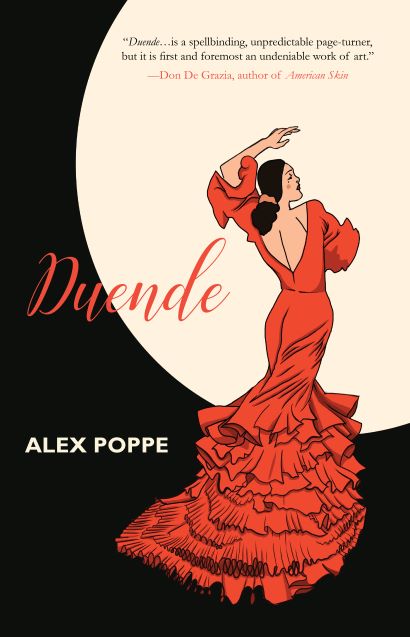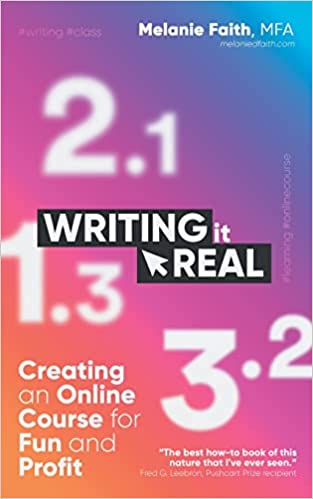Editor’s Note: This exchange is part of a series of brief interviews with emerging writers of recent or forthcoming books. If you enjoyed it, please visit other interviews in the I’ve Got Questions feature.
- What’s the title of your book? Fiction? Nonfiction? Poetry? Who is the publisher and what’s the publication date?
Duende is a fictional, coming-of-age novella using flamenco as a metaphor for becoming. It is published by Regal House Publishing and debuts on June 14, 2022.
- In a couple of sentences, what’s the book about?
Sixteen-year-old Lava lives with her mother Lila and their boarder Cody, an Iraqi War vet, in Detroit’s scarred cityscape. One day her father, Jesse, who was convicted for drug addiction, returns from prison and pressures Lava for urine, so he can pass his drug tests. After an altercation, Jesse is reincarcerated and Lava is sent to live with Lila’s cousin, Lola, in Seville, where a missing girl has captured the community’s attention. Lola is a larger-than-life flamenco dancer who teaches Lava the language of flamenco dance. On the cusp of womanhood and caught between two worlds, Lava explores the voluptuousness inside her, exploring new modes of expression as she experiences first love, friendship, betrayal, uncovers family secrets, and ultimately defines her way to live.
- What’s the book’s genre (for fiction and nonfiction) or primary style (for poetry)?
Literary fiction, coming-of-age fiction.
- What’s the nicest thing anyone has said about the book so far?
“Duende reads like Alex Poppe smashed a stained-glass template of the coming-of-age form, then arranged the shards into a brilliant mosaic. It’s a spellbinding, unpredictable page-turner, but it is first and foremost an undeniable work of art. When an adolescent American girl in Spain dives headfirst into flamenco, a phantasmagoria of uncompromising truths is churned up, but she refuses to turn back in her pursuit of agency.”—Don De Grazia, American Skin
- What book or books is yours comparable to or a cross between? [Is your book like Moby Dick or maybe it’s more like Frankenstein meets Peter Pan?]
Duende could share shelf-space with The Vanishing Half because both are coming-of-age stories of identity, relationship, and the search for family truths. However, the use of flamenco as a metaphor for becoming makes Duende unique. Also, the prose in Duende is lyrical.
- Why this book? Why now?
I worked with youths for many years, and I am fascinated by how adolescent girls develop their sense of identity and self-respect in cultures that devalue them or usurp their agency. Adolescence is a tumultuous time for women; our bodies are revolting, our physical maturity may sprint past our emotional maturity, leaving us ill-equipped to process the wrong kind of attention from males intoxicated on privilege. The denigration amplifies when adolescent girls are not white: a 2021 study by the American Psychological Association shows that Black teens are disciplined in school more harshly than white teens. This same inequity exists in how unsolved rape, murder, and missing person cases are pursued. So often, cases of missing girls fade from the public’s attention, especially if the victims are not white, and the perpetrators remain at large to re-offend. Lava is mixed race, which is subtly stated in the story.
The missing girls on the periphery of Lava’s attention add to her feeling of dislocation and dis-ease. Some of us grow up feeling dislocated in our birth families. I wanted to explore how a character soothes dis-ease and how we create families from the people with whom we feel kinship.
- Other than writing this book, what’s the best job you’ve ever had?
I really enjoyed my life as an actor in New York, and after, my time abroad, teaching and volunteering in the humanitarian aid sector. I am very blessed to have taught in post-conflict zones such as the West Bank and northern Iraq, and to have trained teachers for the Ministry of Higher Education in Baghdad and for the US Department of State in Panama. These experiences helped me understand privilege, hegemonic legacy, and the myth of American exceptionalism.
- What do you want readers to take away from the book?
Duende started out as a dystopian thriller set in the urban blight of early twenty-first century Detroit. Then, I toyed with telling a PTSD, Iraq War veteran story, which resulted in Cody’s character. I also wanted to explore the difficulties of restarting life, post-incarceration, which gave birth to Jesse’s character. I’d like the reader to have conversations about these issues to elevate them, as well as the issue of femicide, to the forefront of cultural attention. I also hope readers get curious about flamenco and investigate the artform. Great flamenco artists include Sara Baras and Rocío Molina, whose work I studied to write this novella.
- What food and/or music do you associate with the book?
Definitely flamenco music, red wine from Cadiz, and goat cheese.
- What book(s) are you reading currently?
I am almost finished with Love, Africa by Jeffrey Gettleman and about a third through True Biz by Sara Novic.
Learn more about Alex on her website.
Buy the book from the publisher (Regal House Publishing), Amazon, or Bookshop.org.




